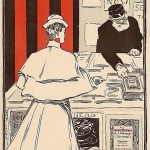You inform me that you desire to be a journalist, and you are kind enough to ask my advice. Well, be a journalist, by all means, in any honest and honourable branch of the profession. But do not be an eavesdropper and a spy. You may fly into a passion when you receive this very plainly worded advice. I hope you will; but, for several reasons, which I now go on to state, I fear that you won’t. I fear that, either by natural gift or by acquired habit, you already possess the imperturbable temper which will be so useful to you if you do join the army of spies and eavesdroppers. If I am right, you have made up your mind to refuse to take offence, as long as by not taking offence you can wriggle yourself forward in the band of journalistic reptiles. You will be revenged on me, in that case, some day; you will lie in wait for me with a dirty bludgeon, and steal on me out of a sewer. If you do, permit me to assure you that I don’t care. But if you are already in a rage, if you are about tearing up this epistle, and are starting to assault me personally, or at least to answer me furiously, then there is every hope for you and for your future. I therefore venture to state my reasons for supposing that you are inclined to begin a course which your father, if he were alive, would deplore, as all honourable men in their hearts must deplore it. When you were at the University (let me congratulate you on your degree) you edited, or helped to edit, The Bull-dog. It was not a very brilliant nor a very witty, but it was an extremely “racy” periodical. It spoke of all men and dons by their nicknames. It was full of second-hand slang. It contained many personal anecdotes, to the detriment of many people. It printed garbled and spiteful versions of private conversations on private affairs. It did not even spare to make comments on ladies, and on the details of domestic life in the town and in the University. The copies which you sent me I glanced at with extreme disgust.
In my time, more than a score of years ago, a similar periodical, but a much more clever periodical, was put forth by members of the University. It contained a novel which, even now, would be worth several ill-gotten guineas to the makers of the chronique scandaleuse. But nobody bought it, and it died an early death. Times have altered, I am a fogey; but the ideas of honour and decency which fogies hold now were held by young men in the sixties of our century. I know very well that these ideas are obsolete. I am not preaching to the world, nor hoping to convert society, but to you, and purely in your own private, spiritual interest. If you enter on this path of tattle, mendacity, and malice, and if, with your cleverness and light hand, you are successful, society will not turn its back on you. You will be feared in many quarters, and welcomed in others. Of your paragraphs people will say that “it is a shame, of course, but it is very amusing.” There are so many shames in the world, shames not at all amusing, that you may see no harm in adding to the number. “If I don’t do it,” you may argue, “some one else will.” Undoubtedly; but why should you do it?
You are not a starving scribbler; if you determine to write, you can write well, though not so easily, on many topics. You have not that last sad excuse of hunger, which drives poor women to the streets, and makes unhappy men act as public blabs and spies. If you take to this métier, it must be because you like it, which means that you enjoy being a listener to and reporter of talk that was never meant for any ears except those in which it was uttered. It means that the hospitable board is not sacred for you; it means that, with you, friendship, honour, all that makes human life better than a low smoking-room, are only valuable for what their betrayal will bring. It means that not even the welfare of your country will prevent you from running to the Press with any secret which you may have been entrusted with, or which you may have surprised. It means, this peculiar kind of profession, that all things open and excellent, and conspicuous to all men, are with you of no account. Art, literature, politics, are to cease to interest you. You are to scheme to surprise gossip about the private lives, dress, and talk of artists, men of letters, politicians. Your professional work will sink below the level of servants’ gossip in a public-house parlour. If you happen to meet a man of known name, you will watch him, will listen to him, will try to sneak into his confidence, and you will blab, for money, about him, and your blab will inevitably be mendacious. In short, like the most pitiable outcasts of womankind, and, without their excuse, you will live by selling your honour. You will not suffer much, nor suffer long. Your conscience will very speedily be seared with a red-hot iron. You will be on the road which leads from mere dishonour to crime; and you may find yourself actually practising chantage, and extorting money as the price of your silence. This is the lowest deep: the vast majority, even of social mouchards, do not sink so low as this.
The profession of the critic, even in honourable and open criticism, is beset with dangers. It is often hard to avoid saying an unkind thing, a cruel thing, which is smart, and which may even be deserved. Who can say that he has escaped this temptation, and what man of heart can think of his own fall without a sense of shame? There are, I admit, authors so antipathetic to me, that I cannot trust myself to review them. Would that I had never reviewed them! They cannot be so bad as they seem to me: they must have qualities which escape my observation. Then there is the temptation to hit back. Some one writes, unjustly or unkindly as you think, of you or of your friends. You wait till your enemy has written a book, and then you have your innings. It is not in nature that your review should be fair: you must inevitably be more on the look-out for faults than merits. The éreintage, the “smashing” of a literary foe is very delightful at the moment, but it does not look well in the light of reflection. But these deeds are mere peccadilloes compared with the confirmed habit of regarding all men and women as fair game for personal tattle and the sating of private spite. Nobody, perhaps, begins with this intention. Most men and women can find ready sophistries. If a report about any one reaches their ears, they say that they are doing him a service by publishing it and enabling him to contradict it. As if any mortal ever listened to a contradiction! And there are charges—that of plagiarism, for example—which can never be disproved, even if contradictions were listened to by the public. The accusation goes everywhere, is copied into every printed rag; the contradiction dies with the daily death of a single newspaper. You may reply that a man of sense will be indifferent to false accusations. He may, or may not be,—that is not the question for you; the question for you is whether you will circulate news that is false, probably, and spiteful, certainly.
In short, the whole affair regards yourself more than it regards the world. Plenty of poison is sold: is it well for you to be one of the merchants? Is it the business of an educated gentleman to live by the trade of an eavesdropper and a blab? In the Memoirs of M. Blowitz he tells you how he began his illustrious career by procuring the publication of remarks which M. Thiers had made to him. He then “went to see M. Thiers, not without some apprehension.” Is that the kind of emotion which you wish to be habitual in your experience? Do you think it agreeable to become shame-faced when you meet people who have conversed with you frankly? Do you enjoy being a sneak, and feeling like a sneak? Do you find blushing pleasant? Of course you will soon lose the power of blushing; but is that an agreeable prospect? Depend on it, there are discomforts in the progress to the brazen, in the journey to the shameless. You may, if your tattle is political, become serviceable to men engaged in great affairs. They may even ask you to their houses, if that is your ambition. You may urge that they condone your deeds, and are even art and part in them. But you must also be aware that they call you, and think you, a reptile. You are not one of those who will do the devil’s work without the devil’s wages; but do you seriously think that the wages are worth the degradation?
Many men think so, and are not in other respects bad men. They may even be kindly and genial. Gentlemen they cannot be, nor men of delicacy, nor men of honour. They have sold themselves and their self-respect, some with ease (they are the least blamable), some with a struggle. They have seen better things, and perhaps vainly long to return to them. These are “St. Satan’s Penitents,” and their remorse is vain:
Virtutem videant, intabescantque relicta.
If you don’t wish to be of this dismal company, there is only one course open to you. Never write for publication one line of personal tattle. Let all men’s persons and private lives be as sacred to you as your father’s,—though there are tattlers who would sell paragraphs about their own mothers if there were a market for the ware. There is no half-way house on this road. Once begin to print private conversation, and you are lost—lost, that is, to delicacy and gradually, to many other things excellent and of good report. The whole question for you is, Do you mind incurring this damnation? If there is nothing in it which appals and revolts you, if your conscience is satisfied with a few ready sophisms, or if you don’t care a pin for your conscience, fall to!
Vous irez loin! You will prattle in print about men’s private lives their hidden motives, their waistcoats, their wives, their boots, their businesses, their incomes. Most of your prattle will inevitably be lies. But go on! nobody will kick you, I deeply regret to say. You will earn money. You will be welcomed in society. You will live and die content, and without remorse. I do not suppose that any particular inferno will await you in the future life. Whoever watches this world “with larger other eyes than ours” will doubtless make allowance for you, as for us all. I am not pretending to be a whit better than you; probably I am worse in many ways, but not in your way. Putting it merely as a matter of taste, I don’t like the way. It makes me sick—that is all. It is a sin which I can comfortably damn, as I am not inclined to it. You may put it in that light; and I have no way of converting you, nor, if I have not dissuaded you, of dissuading you, from continuing, on a larger scale, your practices in The Bull-dog.
- 100 Screenwriting Ideas to Get You Writing - January 20, 2026
- 100 Winter Storm Writing Prompts - January 17, 2026
- 100 Haunted House Story Starters: Craft Your Scariest Tale Yet - January 10, 2026



